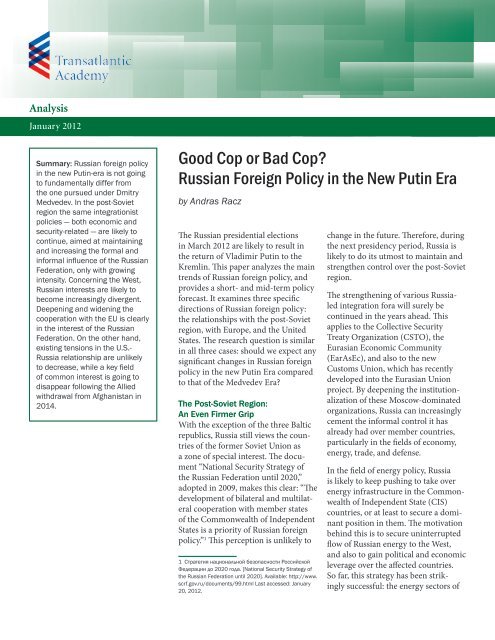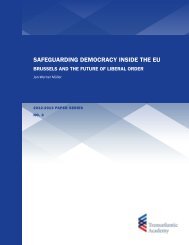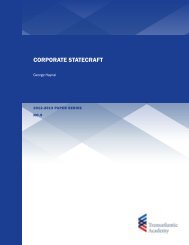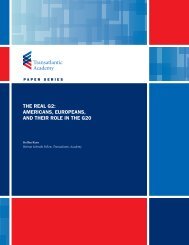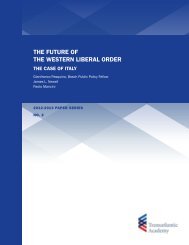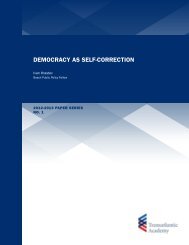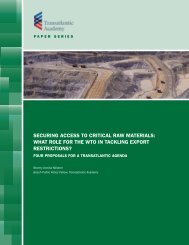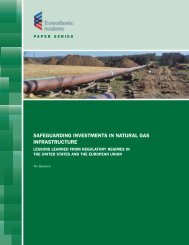Good Cop or Bad Cop? Russian Foreign Policy - Transatlantic ...
Good Cop or Bad Cop? Russian Foreign Policy - Transatlantic ...
Good Cop or Bad Cop? Russian Foreign Policy - Transatlantic ...
You also want an ePaper? Increase the reach of your titles
YUMPU automatically turns print PDFs into web optimized ePapers that Google loves.
Analysis<br />
January 2012<br />
Summary: <strong>Russian</strong> f<strong>or</strong>eign policy<br />
in the new Putin-era is not going<br />
to fundamentally differ from<br />
the one pursued under Dmitry<br />
Medvedev. In the post-Soviet<br />
region the same integrationist<br />
policies — both economic and<br />
security-related — are likely to<br />
continue, aimed at maintaining<br />
and increasing the f<strong>or</strong>mal and<br />
inf<strong>or</strong>mal influence of the <strong>Russian</strong><br />
Federation, only with growing<br />
intensity. Concerning the West,<br />
<strong>Russian</strong> interests are likely to<br />
become increasingly divergent.<br />
Deepening and widening the<br />
cooperation with the EU is clearly<br />
in the interest of the <strong>Russian</strong><br />
Federation. On the other hand,<br />
existing tensions in the U.S.-<br />
Russia relationship are unlikely<br />
to decrease, while a key field<br />
of common interest is going to<br />
disappear following the Allied<br />
withdrawal from Afghanistan in<br />
2014.<br />
<strong>Good</strong> <strong>Cop</strong> <strong>or</strong> <strong>Bad</strong> <strong>Cop</strong>?<br />
<strong>Russian</strong> F<strong>or</strong>eign <strong>Policy</strong> in the New Putin Era<br />
by Andras Racz<br />
The <strong>Russian</strong> presidential elections<br />
in March 2012 are likely to result in<br />
the return of Vladimir Putin to the<br />
Kremlin. This paper analyzes the main<br />
trends of <strong>Russian</strong> f<strong>or</strong>eign policy, and<br />
provides a sh<strong>or</strong>t- and mid-term policy<br />
f<strong>or</strong>ecast. It examines three specific<br />
directions of <strong>Russian</strong> f<strong>or</strong>eign policy:<br />
the relationships with the post-Soviet<br />
region, with Europe, and the United<br />
States. The research question is similar<br />
in all three cases: should we expect any<br />
significant changes in <strong>Russian</strong> f<strong>or</strong>eign<br />
policy in the new Putin Era compared<br />
to that of the Medvedev Era?<br />
The Post-Soviet Region:<br />
An Even Firmer Grip<br />
With the exception of the three Baltic<br />
republics, Russia still views the countries<br />
of the f<strong>or</strong>mer Soviet Union as<br />
a zone of special interest. The document<br />
“National Security Strategy of<br />
the <strong>Russian</strong> Federation until 2020,”<br />
adopted in 2009, makes this clear: “The<br />
development of bilateral and multilateral<br />
cooperation with member states<br />
of the Commonwealth of Independent<br />
States is a pri<strong>or</strong>ity of <strong>Russian</strong> f<strong>or</strong>eign<br />
policy.” 1 This perception is unlikely to<br />
1 Стратегия национальной безопасности Российской<br />
Федерации до 2020 года. [National Security Strategy of<br />
the <strong>Russian</strong> Federation until 2020]. Available: http://www.<br />
scrf.gov.ru/documents/99.html Last accessed: January<br />
20, 2012.<br />
change in the future. Theref<strong>or</strong>e, during<br />
the next presidency period, Russia is<br />
likely to do its utmost to maintain and<br />
strengthen control over the post-Soviet<br />
region.<br />
The strengthening of various Russialed<br />
integration f<strong>or</strong>a will surely be<br />
continued in the years ahead. This<br />
applies to the Collective Security<br />
Treaty Organization (CSTO), the<br />
Eurasian Economic Community<br />
(EarAsEc), and also to the new<br />
Customs Union, which has recently<br />
developed into the Eurasian Union<br />
project. By deepening the institutionalization<br />
of these Moscow-dominated<br />
<strong>or</strong>ganizations, Russia can increasingly<br />
cement the inf<strong>or</strong>mal control it has<br />
already had over member countries,<br />
particularly in the fields of economy,<br />
energy, trade, and defense.<br />
In the field of energy policy, Russia<br />
is likely to keep pushing to take over<br />
energy infrastructure in the Commonwealth<br />
of Independent State (CIS)<br />
countries, <strong>or</strong> at least to secure a dominant<br />
position in them. The motivation<br />
behind this is to secure uninterrupted<br />
flow of <strong>Russian</strong> energy to the West,<br />
and also to gain political and economic<br />
leverage over the affected countries.<br />
So far, this strategy has been strikingly<br />
successful: the energy sect<strong>or</strong>s of
Analysis<br />
Armenia and Moldova are completely controlled by <strong>Russian</strong><br />
companies, Ge<strong>or</strong>gia is highly dependent, and recently the<br />
key Belarusian gas transit company, Beltransgaz, was fully<br />
taken over by <strong>Russian</strong> Gazprom. The last imp<strong>or</strong>tant “prey”<br />
left is the gas transit infrastructure of Ukraine, f<strong>or</strong> which<br />
the struggle is underway. Building alternative pipelines<br />
that bypass Ukraine and Belarus (e.g. the South Stream<br />
and the recently completed N<strong>or</strong>th Stream) fits the same<br />
bill: they weaken these countries’ blackmailing potential<br />
by decreasing their transit role, thereby undermining their<br />
bargaining positions and increasing the security of transit to<br />
Western countries.<br />
Military presence has long been an integral part of the<br />
<strong>Russian</strong> f<strong>or</strong>eign policy invent<strong>or</strong>y towards the CIS region,<br />
aimed both at preserving regional influence, and also at<br />
preventing any future NATO-enlargement to the East.<br />
Maintaining this presence in neighb<strong>or</strong>ing countries will<br />
continue even in the long run, indicated by the fact that<br />
Russia managed to significantly extend <strong>Russian</strong> military<br />
f<strong>or</strong>ces stationing agreements abroad. The current withdrawal<br />
deadline from Ukraine is 2042, and Armenia is<br />
2044, while <strong>Russian</strong> f<strong>or</strong>ces will be deployed even longer in<br />
the two Ge<strong>or</strong>gian separatist “republics.”<br />
Following the planned withdrawal of U.S. f<strong>or</strong>ces from<br />
Afghanistan in 2014, Russia is highly likely to take advantage<br />
of the regional power vacuum and further strengthen<br />
its position in Central Asia. The charter of the CSTO<br />
was recently modified in such a way so as to prohibit any<br />
member state from hosting a f<strong>or</strong>eign military base on its<br />
Following the planned withdrawal<br />
of U.S. f<strong>or</strong>ces from Afghanistan<br />
in 2014, Russia is highly likely to<br />
take advantage of the regional<br />
power vacuum and further<br />
strengthen its position in Central<br />
Asia.<br />
2<br />
territ<strong>or</strong>y without the consent of all other CSTO members.<br />
This move, in fact, is aimed at gradually pushing out all<br />
non-<strong>Russian</strong> military bases from the territ<strong>or</strong>ies of the CSTO<br />
countries.<br />
During the next presidential administration, Russia is<br />
highly likely to extensively use its political, economic, and<br />
media leverage to influence the domestic politics in post-<br />
Soviet countries. In this way, 2012-2013 will be particularly<br />
intensive years. In 2012, parliamentary elections will take<br />
place in Ge<strong>or</strong>gia, Ukraine, Belarus, Armenia, and possibly<br />
also in Moldova, while in 2013, presidential elections will be<br />
held in Ukraine, Ge<strong>or</strong>gia, Armenia, and Azerbaijan, Tajikistan,<br />
and Turkmenistan. Aside from the latter three, the<br />
political landscapes in these countries are rather diverse, so<br />
intense political struggles are likely to take place, and Russia<br />
will surely not miss the opp<strong>or</strong>tunity to actively pursue its<br />
own interests.<br />
Relations with the EU: Modernization Goes On<br />
Contrary to the post-Soviet trends, Russia is likely to<br />
continue to try to improve its relations with the European<br />
Union. The most imp<strong>or</strong>tant motivation is the modernization<br />
agenda, launched by President Medvedev. The supp<strong>or</strong>t<br />
of Europe is critical f<strong>or</strong> the intended economic, financial,<br />
and technological modernization of the <strong>Russian</strong> Federation.<br />
Looking at the presidential campaign program of<br />
Vladimir Putin on the newly launched Putin2012 website, 2<br />
it becomes clear that the modernization project will indeed<br />
be continued, and so, the need f<strong>or</strong> close ties to Europe will<br />
also remain.<br />
Economic interests point in the same direction. Bilateral<br />
trade and investments between the EU and Russia are<br />
growing rapidly, despite the crisis. Besides, energy interdependence<br />
(e.g. the EU needs <strong>Russian</strong> oil and gas, while<br />
Russia needs EU money) is not likely to decrease in the<br />
near future, particularly in the light of the post-Fukushima<br />
closing down of German nuclear power plants. The coming<br />
WTO-accession of Russia will further intensify trade relations<br />
with European countries.<br />
Moscow will continue to push f<strong>or</strong> an institutionalized<br />
position on issues of European security as well. Certain<br />
European countries are indeed receptive to the idea. There<br />
are various options on the table: in November 2009, Presi-<br />
2 www.putin2012.ru Last accessed: January 20, 2012.
Analysis<br />
dent Medvedev launched his proposal on need f<strong>or</strong> a New<br />
European Security Treaty; in June 2010, a bilateral German-<br />
<strong>Russian</strong> proposal on security policy cooperation was signed<br />
in Meseberg, quickly joined by France in October the same<br />
year. Another option is getting the French-German-Polish<br />
Weimar Triangle cooperation extended to Russia. The<br />
common element in these initiatives is the <strong>Russian</strong> intention<br />
to get decision-making positions institutionalized in<br />
issues of European security that would be stronger than the<br />
consultative ones it currently holds.<br />
The U.S.-Russia Relationship: A “Reset” Freezing Down?<br />
The nature of the future U.S.-Russia relationship obviously<br />
depends a lot on the outcome of the U.S. presidential elections.<br />
And no significant positive development is likely to<br />
happen in 2012 as the pre-election period is hardly suitable<br />
f<strong>or</strong> U.S. politicians taking a soft position on Russia.<br />
However, as a starting point f<strong>or</strong> mid-term predictions, one<br />
may well presume that a Democratic administration in<br />
Washington is m<strong>or</strong>e likely to follow a rather m<strong>or</strong>e cooperative<br />
course with Moscow than a Republican one. Regardless<br />
of the election results, however, certain mid-term sources of<br />
tension in the U.S.-Russia bilateral relationship are already<br />
visible.<br />
The most imp<strong>or</strong>tant one is that with the f<strong>or</strong>thcoming<br />
Allied withdrawal from Afghanistan in 2014, a key area of<br />
common U.S.-Russia interests is going to disappear. Perhaps<br />
the most imp<strong>or</strong>tant practical result of the “reset” was the<br />
U.S.-Russia cooperation in Afghanistan, in particular<br />
Moscow’s allowing the transit of military shipments over<br />
<strong>Russian</strong> territ<strong>or</strong>y, which made supply management f<strong>or</strong><br />
Allied f<strong>or</strong>ces a lot easier and cheaper. Termination of the<br />
large-scale U.S. engagement will end this fruitful practical<br />
cooperation.<br />
The missile defense debate is likely to remain another<br />
source of tension. Russia clearly perceives the ballistic<br />
missile defense (BMD) system as a fundamental threat to<br />
its nuclear deterrence capabilities. Acc<strong>or</strong>ding the Military<br />
Doctrine of the <strong>Russian</strong> Federation, 3 adopted in 2010, one<br />
of the main external military dangers is the “the creation<br />
and deployment of strategic missile defense systems that<br />
undermine global stability.” Russia has kept demanding<br />
3 Военная доктрина Российской Федерации. [Military Doctrine of the <strong>Russian</strong> Federation.]<br />
Available: http://www.scrf.gov.ru/documents/33.html Last accessed: January 20,<br />
2012.<br />
3<br />
first to have an institutionalized position inside the BMD<br />
system, then to be given legally binding guarantees that<br />
the system will not be used against Russia. Neither of this<br />
is likely to happen, since the current U.S. position seems<br />
being constant on the issue, something Russia is well aware<br />
of. Consequently, as the U.S. missile defense system gets<br />
further developed, tensions are likely to increase.<br />
The <strong>Russian</strong> position on Iran’s nuclear program significantly<br />
differs from that of the United States. However, it also has<br />
its ambivalences. Though Moscow is concerned about the<br />
possibility of an Iranian nuclear weapon, a direct U.S. military<br />
action would clearly be unacceptable to Russia. This, of<br />
course, does not mean that Russia would be ready to take<br />
up any military confrontation over Iran. Russia actually has<br />
its own proposals on the table aimed at ensuring the exclusively<br />
peaceful nature of the Iranian nuclear program — and<br />
also at maintaining the lucrative contracts <strong>Russian</strong> companies<br />
have in the Iranian energy sect<strong>or</strong>. All in all, as the<br />
Iranian nuclear program develops, the gap between the U.S.<br />
attitude urging action and the <strong>Russian</strong> strategy of mediating<br />
and preserving the status quo is likely to become wider.<br />
The toughening <strong>Russian</strong> position on the post-Soviet space<br />
may also have a negative effect on U.S.-Russia relations.<br />
A key U.S. ally in the region, Ge<strong>or</strong>gia, may again become<br />
a hotspot. F<strong>or</strong>tunately, serious military confrontation can<br />
be excluded. As the separatists territ<strong>or</strong>ies of Abkhazia<br />
and South Ossetia are under its firm control, Russia has<br />
nothing to fight f<strong>or</strong>, and Ge<strong>or</strong>gia also learned grave lessons<br />
from the 2008 war. However, Russia is strongly opposed to<br />
Russia has its own proposals on<br />
the table aimed at ensuring the<br />
exclusively peaceful nature of the<br />
Iranian nuclear program — and<br />
also at maintaining the lucrative<br />
contracts <strong>Russian</strong> companies have<br />
in the Iranian energy sect<strong>or</strong>.
Analysis<br />
the current pro-Western course of Ge<strong>or</strong>gian f<strong>or</strong>eign and<br />
security policy, and may take the opp<strong>or</strong>tunity offered by the<br />
coming Ge<strong>or</strong>gian elections to intervene in domestic politics.<br />
Such moves will, if only as an unintended consequence,<br />
certainly affect the U.S.-Russia relationship as well.<br />
Conclusions<br />
These diverging strategic courses may well provide a fertile<br />
ground f<strong>or</strong> a deliberate “divide and rule” strategy to be<br />
pursued by Russia in its relations with the West. The preference<br />
f<strong>or</strong> a multi-polar w<strong>or</strong>ld is clearly present both in the<br />
F<strong>or</strong>eign <strong>Policy</strong> Concept of the <strong>Russian</strong> Federation 4 and in<br />
the declarations of various <strong>Russian</strong> top officials. Hence,<br />
from Moscow’s perspective, it would be absolutely rational<br />
to follow fundamentally different f<strong>or</strong>eign policy courses<br />
with the United States and the EU, contributing to the<br />
goal of multi-polarity by weakening transatlantic cooperation.<br />
All in all, following the return of Vladimir Putin to<br />
presidency, maintaining the coherence of the transatlantic<br />
community is going to require particular attention both<br />
from the United States and the EU.<br />
4 The F<strong>or</strong>eign <strong>Policy</strong> Concept of the <strong>Russian</strong> Federation. Available: http://archive.kremlin.<br />
ru/eng/text/docs/2008/07/204750.shtml Last accessed: January 20, 2012.<br />
4<br />
About the Auth<strong>or</strong><br />
Andras Racz is a Volkswagen Foundation Visiting Fellow at the <strong>Transatlantic</strong><br />
Academy. He is an expert on EU f<strong>or</strong>eign and security policy,<br />
the European Neighb<strong>or</strong>hood <strong>Policy</strong>, and the post-Soviet region, and<br />
currently w<strong>or</strong>ks as a seni<strong>or</strong> research fellow at the Hungarian Institute<br />
of International Affairs. He also lectures at the Department of International<br />
Studies at the Péter Pázmány Catholic University in Budapest.<br />
Previously he w<strong>or</strong>ked as a research fellow at the Institute f<strong>or</strong> Strategic<br />
and Defense Studies at the Zrínyi Miklós National Defense University<br />
and the Hungarian Institute of International Affairs.<br />
The views expressed here are of the auth<strong>or</strong>’s own, and they no way<br />
represent the official position of the <strong>Transatlantic</strong> Academy, Volkswagen,<br />
<strong>or</strong> the German Marshall Fund.<br />
<strong>Transatlantic</strong> Academy Paper Series<br />
The <strong>Transatlantic</strong> Academy Paper Series presents research on a variety<br />
of transatlantic topics by staff, fellows, and partners of the <strong>Transatlantic</strong><br />
Academy. Comments from readers are welcome; please reply by<br />
e-mail to TA@gmfus.<strong>or</strong>g.<br />
About the <strong>Transatlantic</strong> Academy<br />
The <strong>Transatlantic</strong> Academy is a research institution devoted to creating<br />
common approaches to the long-term challenges facing Europe and<br />
N<strong>or</strong>th America. The Academy does this by each year bringing together<br />
scholars, policy experts, and auth<strong>or</strong>s from both sides of the Atlantic<br />
and from different disciplinary perspectives to research and analyze<br />
a distinct policy theme of transatlantic interest. The Academy was<br />
created in 2007 as a partnership between the German Marshall Fund<br />
of the United States (GMF) and the ZEIT-Stiftung Ebelin und Gerd<br />
Bucerius. The Robert Bosch Stiftung and the Lynde and Harry Bradley<br />
Foundation joined as full partners beginning in 2008, and the Fritz<br />
Thyssen Foundation joined as a full partner in 2011. The Compagnia<br />
di San Paolo joined in providing additional supp<strong>or</strong>t in May 2009, as<br />
did the Joachim Herz Stiftung and the Volkswagen Stifung in 2011.<br />
The <strong>Transatlantic</strong> Academy’s Volkswagen Visiting Fellowship is made<br />
possible with generous supp<strong>or</strong>t from the Volkswagen Stiftung.


